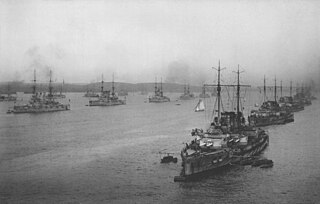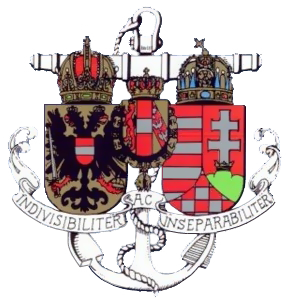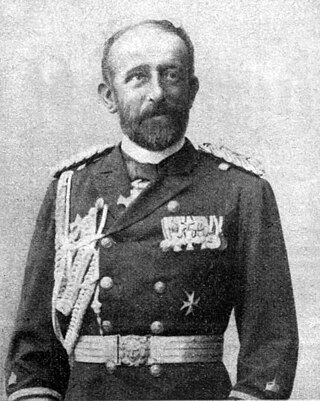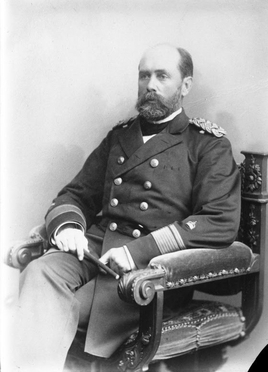
The Imperial German Navy or the Kaiserliche Marine was the navy of the German Empire, which existed between 1871 and 1919. It grew out of the small Prussian Navy, which was mainly for coast defence. Kaiser Wilhelm II greatly expanded the navy. The key leader was Admiral Alfred von Tirpitz, who greatly expanded the size and quality of the navy, while adopting the sea power theories of American strategist Alfred Thayer Mahan. The result was a naval arms race with Britain, as the German navy grew to become one of the greatest maritime forces in the world, second only to the Royal Navy.

Alfred Peter Friedrich von Tirpitz was a German grand admiral and State Secretary of the German Imperial Naval Office, the powerful administrative branch of the German Imperial Navy from 1897 until 1916.

General admiral or Admiral general was first a Dutch then Danish, German, Russian, Portuguese, Spanish and Swedish naval rank. Its historic origin is a title high military or naval dignitaries of early modern Europe sometimes held, for example the (nominal) commander-in-chief of the Dutch Republic's navy.

The Austro-Hungarian Navy or Imperial and Royal War Navy was the naval force of Austria-Hungary. Ships of the Austro-Hungarian Navy were designated SMS, for Seiner Majestät Schiff. The k.u.k. Kriegsmarine came into being after the formation of Austria-Hungary in 1867, and ceased to exist in 1918 upon the Empire's defeat and subsequent collapse at the end of World War I.

The Ministry of the Navy was a cabinet-level ministry in the Empire of Japan charged with the administrative affairs of the Imperial Japanese Navy (IJN). It existed from 1872 to 1945.

Eduard von Capelle was a German Imperial Navy officer from Celle. He joined the Imperial German Navy in 1872, serving in various roles, including as an executive officer of the battleship SMS Weissenburg and chief of the administrative department in the Reichsmarineamt. Working closely with Admiral Alfred von Tirpitz, he was primarily responsible for drafting the Flottengesetze, and was promoted to admiral in 1913. He was supportive of Germany's entry into war during July Crisis of 1914.

The Federal Ministry of Defence, abbreviated BMVg, is a top-level federal agency, headed by the Federal Minister of Defence as a member of the Cabinet of Germany. The ministry is headquartered at the Hardthöhe district in Bonn and has a second office in the Bendlerblock building in Berlin, which is occasionally used as a metonym to denote the entire Ministry.

The Imperial Japanese Army General Staff Office, also called the Army General Staff, was one of the two principal agencies charged with overseeing the Imperial Japanese Army.

SMS Bayern was one of four Sachsen-class armored frigates of the German Kaiserliche Marine. Her sister ships were Sachsen, Baden, and Württemberg. Named for Bavaria, Bayern was built by the Kaiserliche Werft in Kiel from 1874 to 1881. The ship was commissioned into the Imperial Navy in August 1881. She was armed with a main battery of six 26 cm (10.2 in) guns in two open barbettes.
Seebataillon, literally "sea battalion", is a German term for certain troops of naval infantry or marines. It was used by the Prussian Navy, the North German Federal Navy, the Imperial German Navy, the Austro-Hungarian Navy, the Kriegsmarine, and briefly in the Bundesmarine. In 2014, also the modern German Navy established a naval force protection unit called Seebataillon.
Carl August Amon von Heeringen was a Prussian admiral of the German Empire. He headed the Imperial Navy News Office and served as the Chief of the German Naval General Staff (Admiralstab) 12 March 1911 – 31 March 1913, and was present at the famous War Council of 8 December 1912.

Georg Alexander von Müller was an Admiral of the Imperial German Navy and a close friend of the Kaiser in the run up to the First World War.

Gustav Ernst Otto Egon Freiherr (Baron) von Senden-Bibran was an admiral of the German Imperial Navy.

Ernst Otto von Diederichs was a German admiral of the Prussian Navy who served both the Kingdom of Prussia and the German Empire. He was the first governor of the German Jiaozhou Bay concession in China.

The Military Cabinet (Militärkabinett) was a military advisory body under the direct command of the King of Prussia, and by extension the German Emperor after 1871, for handling personnel matters of the army officer corps. It emerged from the Prussian Army personnel department in the wake of the 1809 reform of the military, and was officially established 3 June 1814. It developed under Emperor Wilhelm II into a personal instrument of the monarch for processing all military matters.

The Imperial Naval Office was a government agency of the German Empire. It was established in April 1889, when the German Imperial Admiralty was abolished and its duties divided among three new entities: the Imperial Naval High Command, the Imperial Naval Cabinet and the Imperial Naval Office performing the functions of a ministry for the Imperial German Navy.

The German Imperial Admiralty Staff was one of four command agencies for the administration of the Imperial German Navy from 1899 to 1918. While the German Emperor Wilhelm II as commander-in-chief exercised supreme operational command and control of the naval forces, the military staff was split into the Admiralty, the Naval Office, the Naval Cabinet, and the Inspector-General. The command structure had a negative impact on German naval warfare in World War I, as a professional head of the Imperial Navy, similar to the First Sea Lord, was not established until August 1918. After the war and the German Revolution of 1918–19, the Admiralty Staff became subordinate to the Naval Office and was finally disestablished by order of the German President.

Victor Valois (1841–1924), also called Anton Friedrich Victor Valois, was a vice-admiral (Vizeadmiral) in the German Imperial Navy. He graduated from the post-graduate Naval War College, the Imperial Naval Academy (Marineakademie) in 1874 in a class with three other future admirals: Otto von Diederichs, Felix von Bendemann, Gustav von Senden-Bibran.

Felix von Bendemann was an Admiral of the German Imperial Navy.
This is the order of battle of the Imperial German Navy on the outbreak of World War I in August 1914.

















